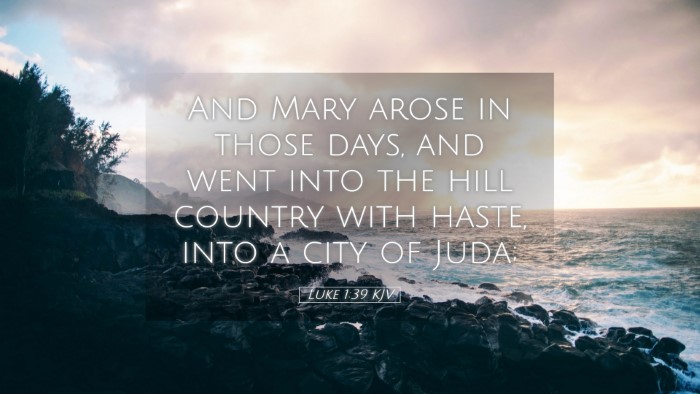Commentary on Luke 1:39
Verse Context: Luke 1:39 reads, "In those days Mary arose and went with haste into the hill country, to a town in Judah." This verse marks a significant moment in the narrative surrounding the birth of Jesus, specifically illustrating the urgency and zeal with which Mary responds to the angel’s announcement of the impending miraculous birth.
Overall Significance
This passage is pivotal not only for its narrative quality but also for its theological implications. Mary’s journey signifies both her obedience and the fulfillment of God’s plan. It highlights themes of faith, community, and the recognition of divine revelation.
Commentary Insights
Matthew Henry's Commentary
Matthew Henry emphasizes the moral and spiritual attributes of Mary in this verse. He notes:
- Her Promptness: Mary "arose and went with haste," indicating her promptness in responding to God's will. This serves as an example to believers of the importance of immediate obedience to God's call.
- Faith in Action: Mary's movement to the hill country can be viewed as both a physical and spiritual journey. Henry underscores that true faith often expresses itself through action, which is evident in Mary’s haste to visit her relative Elizabeth, who was also experiencing a miraculous pregnancy.
- Community Support: The journey to Elizabeth is also seen as a quest for community and support during a pivotal moment in her life. Henry highlights that in times of crisis or significant change, finding companionship among believers is crucial.
Albert Barnes' Commentary
Albert Barnes offers a more analytical approach, considering historical and geographical aspects of Mary’s journey:
- Historical Context: Barnes discusses the importance of understanding the geographical location Mary traversed. The "hill country" refers to an area that was not only rural but also significant for its religious heritage, linking it back to God's preceding acts in the Old Testament.
- Mary’s Decision: Barnes considers Mary’s decision to leave Nazareth, suggesting that it reflects her desire for fellowship with someone who understands her extraordinary situation. The visit signifies a profound connection between two mothers chosen by God to fulfill His promises.
- Implications of 'Rising': The term "arose" implies that Mary was not passive but rather took the initiative in moving forward with God’s plan. This act of rising can be interpreted spiritually, as it denotes a readiness to engage in God’s purpose amidst the challenges ahead.
Adam Clarke's Commentary
Adam Clarke provides additional theological insights, focusing on the spiritual dimensions of Mary's visitation.
- Holy Spirit's Influence: Clarke posits that Mary’s decision to visit Elizabeth after receiving the news from the angel indicates the work of the Holy Spirit, who stirs within believers to connect with one another for mutual encouragement and confirmation.
- Symbolism of the Journey: He interprets this journey as a symbolic passage toward greater understanding and fulfillment of God’s word. Mary exemplifies the believer’s journey—seeking God’s presence and confirmation through community.
- Prophetic Foreshadowing: Clarke also notes that this meeting between Mary and Elizabeth foreshadows the unity of the Gospel message. It exemplifies how God’s purposes span generations, connecting past promises with present realities.
Theological Reflections
These commentaries collectively underscore several key theological themes found within this simple yet profound verse:
- Obedience and Faith: Mary's swift action illustrates obedience to God's calling. This theme invites reflection on how believers manage their own responses to divine directives.
- Importance of Fellowship: Mary’s visit invites contemplation on the role of community in the life of faith. Just as Mary sought out Elizabeth for encouragement, so too should believers seek community during pivotal moments in their lives.
- Divine Confirmation: The encounter between Mary and Elizabeth leads to mutual affirmation of God's will, showcasing how God often confirms His plans through relationships.
- The Role of Women in Salvation History: This passage highlights the significant roles that women play in the biblical narrative, encouraging a deeper appreciation for their contributions in God’s salvation history.
Conclusion
Luke 1:39 serves as a rich text for understanding the complexities of faith, obedience, and community within the Gospel narrative. Through the insights of Matthew Henry, Albert Barnes, and Adam Clarke, this commentary reveals layers of meaning that speak to both the individual believer and the larger community of faith. As we reflect on Mary's journey, let us be inspired to respond to God's call with similar urgency and faithfulness, seeking out the community that God places in our path.


